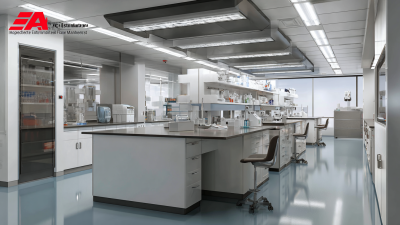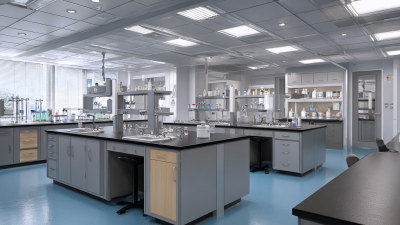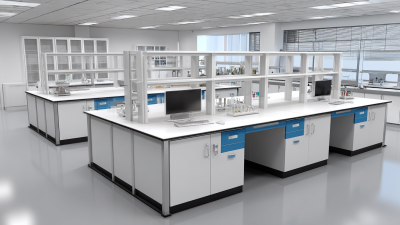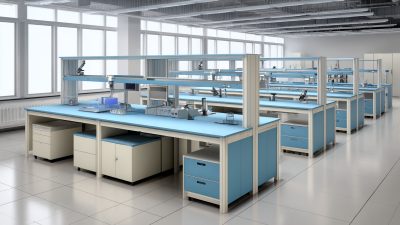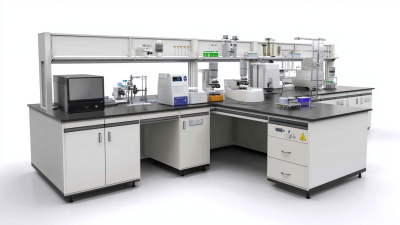Choosing the right laboratory furniture supplier is a crucial decision that can significantly impact the efficiency and functionality of your laboratory space. As the demand for innovative and adaptable lab environments grows, selecting a supplier who understands the unique needs of your specific setup becomes paramount. This article explores innovative approaches to identifying the best laboratory furniture supplier, taking into consideration factors such as quality, customization options, sustainability, and support services. By leveraging digital tools and new methodologies in supplier selection, lab managers and researchers can ensure they not only acquire high-quality furniture but also foster a collaborative relationship with the supplier that meets their long-term needs. Ultimately, this insightful exploration aims to equip professionals with the knowledge needed to make informed and confident decisions when sourcing their laboratory furniture.

When selecting the best laboratory furniture supplier, the first step is to clearly identify your specific needs and priorities. This involves evaluating the types of experiments and processes that will be conducted in your lab. Consider factors such as the required storage capacity, the need for specialized surfaces resistant to chemicals, and the space constraints within the laboratory. Engaging with your team to gather their input can provide valuable insights into practical requirements and preferences that might not be immediately apparent.
Next, prioritize your requirements based on both functionality and budget. For instance, if the lab will primarily conduct research involving hazardous materials, investing in durable, safety-compliant furniture should take precedence. Conversely, in a teaching lab environment, flexibility and adaptability may be more critical, leading to a focus on modular solutions. By systematically assessing and prioritizing your laboratory requirements, you can streamline the selection process, ensuring that the chosen supplier aligns with your vision and operational demands.

When it comes to outfitting a laboratory, selecting the right furniture supplier is crucial for ensuring functionality and efficiency. Researching potential laboratory furniture suppliers starts with identifying your specific needs, such as the type of work being conducted, space constraints, and the desired materials. Utilizing online resources, industry directories, and professional recommendations can help narrow down your options. It’s essential to consider suppliers who specialize in laboratory environments, as they have a deeper understanding of safety standards and ergonomic requirements.

Once a list of potential suppliers is compiled, comparing their offerings becomes the next step. Pay attention to factors such as product range, customization options, warranty, and after-sales support. Requesting samples or visiting showrooms can provide insight into the quality of materials and craftsmanship. Additionally, reading customer reviews and testimonials will offer perspectives from those who have firsthand experience with the products. Conducting thorough research and comparisons will ultimately lead to a well-informed decision, ensuring that your laboratory is equipped with furniture that meets both practical needs and budgetary constraints.
When selecting a laboratory furniture supplier, evaluating the supplier's reputation and customer feedback is crucial. Begin by researching the supplier's history and market presence. Look for companies with a solid track record of providing high-quality laboratory furniture and a commitment to customer satisfaction. Industry certifications and memberships in professional organizations can also indicate reliability and expertise.
Customer feedback plays a vital role in assessing supplier suitability. Utilize online reviews, testimonials, and case studies to gain insights into the experiences of past clients. Consider both the positive and negative comments to understand common strengths and weaknesses. Engaging with current customers through forums or direct outreach can provide additional perspectives on the supplier's responsiveness and support. By prioritizing reputation and customer feedback, you can make a well-informed decision that aligns with your laboratory's specific needs.
When selecting laboratory furniture suppliers, understanding warranty, service, and maintenance options is crucial. A solid warranty indicates the manufacturer's confidence in their product and serves as a safeguard against manufacturing defects. Look for suppliers that offer comprehensive warranties covering a range of issues, ideally extending beyond standard coverage to ensure long-term protection for your investment.
Additionally, assess the service options provided by the supplier. A reliable supplier should offer prompt and efficient customer support, including installation assistance and troubleshooting help. Maintenance options are equally important; suppliers that provide regular maintenance services can help prolong the lifespan of your laboratory furniture and enhance its performance. By weighing these factors, you can make an informed decision and select a supplier that aligns with your specific laboratory needs, ensuring optimal function and durability.
In the evolving landscape of laboratory furniture procurement, leveraging technology has become a pivotal strategy for organizations seeking the best suppliers. The integration of advanced HR technology tools has been shown to streamline processes significantly, improve efficiency, and enable data-driven decision-making. For instance, recent reports indicate that implementing AI in procurement can enhance supplier selection by analyzing vast amounts of data to pinpoint the most suitable options based on specific criteria. This technological advancement supports a proactive approach in identifying and evaluating potential laboratory furniture suppliers.
Moreover, with the increasing reliance on artificial intelligence and the Internet of Things (IoT), businesses can create a more efficient selection process. Current statistics reveal that organizations adopting AI tools in their procurement operations experience up to a 30% reduction in time spent on supplier evaluation. By utilizing these innovative technologies, labs can not only address their unique furniture needs but also enhance their overall operational strategies. As the industry continues to evolve, embracing such technological innovations will be essential for staying competitive and meeting the dynamic demands of laboratory environments.

